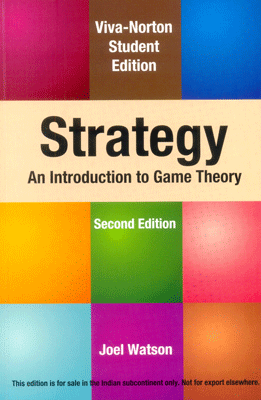Strategy, 2/ E
Strategy, 2/ E
An Introduction to Game Theory
₹625.50 ₹695.00 Save: ₹69.50 (10%)
Go to cartISBN: 9788130915999
Bind: Paperback
Year: 2020
Pages: 424
Size: 153 x 229 mm
Publisher: W. W. Norton & Company
Published in India by: Viva Books
Exclusive Distributors: Viva Books
Sales Territory: India, Nepal, Pakistan, Bangladesh, Sri Lanka
Reviews:
"Strategy is the first undergraduate text to combine game theory and contract theory, two of the most important developments in theoretical economics in the last 50 years. Professor Watson has done an excellent job on the book, and I expect it to be both popular and influential."
—George Malath, University of Pennsylvania
"Strategy is a superb introduction to game theory. It provides a clear and comprehensive coverage of the fundamentals. Numerous insightful examples illustrate key principles. I have successfully used this text, and highly recommend it."
—Ennio Stacchetti, New York University
Description:
Features of STRATEGY, SECOND EDITION, include:
NEW: Chapter on General Assumptions and Methodology : This added chapter provides an overview of how mathematical models can be used to predict how people will behave in strategic situations.
NEW: Guided Exercises : Game theory is best mastered by problem solving, and Strategy, Second Edition, has numerous end-of-chapter exercises. A "guided exercise" has been added to each chapter to help students understand how to approach and work through problems.
NEW: Topics for Political Economists and Political Scientists : The Second Edition includes new sections on the median voter theorem and candidates? equilibrium policy locations, strategic voting, multilateral bargaining in legislatures over proposals and amendments to new laws, and information aggregation and jury deliberations.
More on Contracting and Contract Enforcement : A wide range of interesting strategic behavior relates to the formation and enforcement of contracts, and Strategy, Second Edition, includes expanded coverage of the hold-up problem, unverifiable investments, up-front contracting, and option contracts.
Target Audience:
Students of economics, management.
Contents:
Preface • Introduction: Noncooperative Game Theory • Contract and Cooperative Game Theory • The Meaning of "Game" • PART I: Representations and Basic Assumptions • The Extensive Form : Other Examples and Conventions • Guided Exercise • Exercises • Strategy and the Normal Form: Terminology and Notation for Strategies • The NormaI Form • Classic Normal-Form Games • Interpretation of the Normal Form • Guided Exercise • Exercises • Beliefs, Mixed Strategies, and Expected Payoffs : Guided Exercise • Exercises • General Assumptions and Methodology : Rationality • Common Knowledge • Overview of Solution Concepts • The Issue of Realism • Part II: Analysing Behaviour in Static Settings • Dominance and Best Response: Dominance • The First Strategic Tension and the Prisoners? Dilemma • The Concept of Efficiency • Best Response • Dominance and Best Response Compared • Guided Exercise • Exercises • Rationalizability and Iterated Dominance : The Second Strategic Tension • Guided Exercise • Exercises • Location and Partnership: A Location Gameh A Partnership Game: Strategic Complementarities • Guided Exercise • Exercises • Nash Equilibrium : Congruous Sets • Nash Equilibrium Defined • Equilibrium of the Partnership Game • Coordination and Social Welfare • The Third Strategic Tension • Aside: Experimental Game Theory • Guided Exercise • Exercises • Oligopoly, Tariffs, Crime, and Voting: Cournot Duopoly Model • Bertrand Duopoly Model • Tariff Setting by Two Countries • A Model of Crime and Police • The Median Voter Theorem • Strategic Voting • Guided Exercise • Exercises • Mixed -Strategy Nash Equilibrium: Guided Exercise • Exercises • Strictly Competitive Games and Security strategies: Guided Exercise • Exercises • Contract, Law and Enforcement in Stratic Settings : Complete Contracting in Discretionary Environments • Contracting with Court-Imposed Breach Remedies • Guided Exercise • Exercises • Part III : Analyzing Behaviour in Dynamic Settings • Details of the Extensive Form • Guided Exercise • Exercises • Backward Introduction and Subgame Perfection: Sequential Rationality and Backward Induction • Subgame Perfection • Guided Exercise • Exercises • Topics in Industrial Organization: Advertising and Competition • A Model of Limit Capacity • Dynamic Monopoly • Price Guarantees as a Commitment to High Prices • Guided Exercise • Exercises • Parlor Games : Guided Exercise • Exercises • Bargaining Problems: Bargaining: Value Creation and Division • An Abstract Representation of Bargaining Problems • An Example • The Standard Bargaining Solution • Guided Exercise • Exercises • Analysis of Simple Bargaining Games : Ultimatum Games: Power to the Proposer • Two-Period, Alternating-Offer Games: Power to the Patient • Infinite-Period, Alternating-Offer Game • Multilateral Bargaining • Guided Exercise • Exercises • Games with Joint Decisions; Negotiation Equilibrium: Joint Decisions • Negotiation Equilibrium • Example: Contracting for High-Powered Incentives • Guided Exercise • Exercises • Unverifiable Investment, Hold Up, Options, and Ownership: Hold-Up Example • Up-Front Contracting and Option Contracts • Asset Ownership • Guided Exercise • Exercises • Repeated Games and Reputation : A Two-Period Repeated Game • An Infinitely Repeated Game • The Equilibrium Payoff Set with Low Discounting • Guided Exercise • Exercises • Collusion, Trade Agreements, and Goodwill: Dynamic Oligopoly and Collusion • Enforcing International Trade Agreements • Goodwill and Trading a Reputation • Guided Exercise • Exercises • Part IV: Information • Random Events and Incomplete Information : Guided Exercise • Exercises • Risk and Incentives in Contracting: Risk Aversion • A Principal-Agent Game • Guided Exercise • Exercises • Bayesian Nash Equilibrium and Rationalizability: Guided Exercise • Exercises • Lemons, Auctions, and Information Aggregation : Markets and Lemons • Auctions • Information Aggregation • Guided Exercise • Exercises • Perfect Bayesian Equilibrium: Conditional Beliefs about Types • Sequential Rationality • Consistency of Beliefs • Equilibrium Definition • Guided Exercise • Exercises • Job-Market Signaling and Reputation: Jobs and School • Reputation and Incomplete Information • Guided Exercise • Exercises • Appendices: Review of Mathematics • Sets • Functions and Calculus • Probability • The Mathematics of Rationalizability and Existence of Nash Equilibrium : Dominance, Best Responses and Correlated Conjectures • Rationalizability Construction • Existence of Nash Equilibrium • Exercises • Index
About the Author:
Joel Watson is professor of economics at the University of California, San Diego. He received his B.A. from the University of California, San Diego, and his Ph.D. from Stanford University. Watson's work has been published in a variety of leading journals, including American Economic Review, Econometrica, Journal of Economic Theory, Quarterly Journal of Economics, and Games and Economic Behavior.







